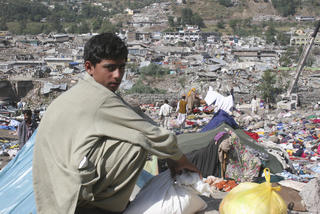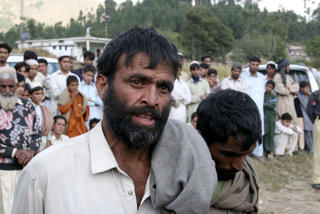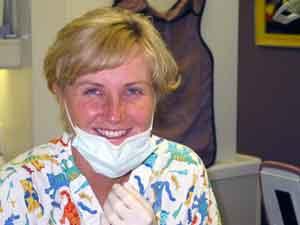Many Unaccompanied Children Arriving at New Tent Village for Quake Survivors, Reports CWS
Governments Ratchet Up Support, But Still Not Enough, Say Aid Agencies--Still Dire Need for Tents, More Helicopters
BISYAN, PAKISTAN--Fri Oct 28--In the tent village established in Bisyan, humanitarian agency Church World Service aid workers say they are noticing a sad trend: that an increasing number of those now showing up to take residency in the camp are children with no elders to support them.
Church World Service (CWS) reports it is now expanding the tent village to provide shelter and medical services for 2,450 of the quakes most vulnerable survivors. The Church of Pakistan will provide medical services within the camp.
The emergency shelter village is part of accelerated efforts by CWS, other aid agencies, the Pakistani government, the U.S., and the United Nations and other world bodies, now racing against time to rescue and bring aid to some 800,000 people still homeless before winters killing onslaught descends in the next couple of weeks in the remote Himalayan area.
But the troubling evidence of children orphaned by the disaster or separated from their families is evoking concerns for a haunted, traumatized generation. And lack of skilled emergency medical and surgical expertise is causing another layer of trauma.
Everywhere, the childrens eyes are breaking our hearts.
CWSs Parvez says, "Everywhere, the childrens eyes are breaking our hearts. Most have lost at least a father or a mother," he says. "There is no clear figure as to how many children are displaced.
"We are receiving reports," he said, "that the limbs of quake-affected children are being amputated at the Pakistan Institute of Medical Sciences, Polyclinic, and other hospitals because of lack of plastic surgery experts."
"According to experts," he said, "many quake-affected children in Pakistan are suffering from mental disorders and physical disabilities owing to lack of psychiatrists and plastic surgery experts in the country."
In addition to emergency relief, CWS is already beginning to put pieces in place to provide psychosocial services for quake survivors, especially the children, and the agencys long-term response will include shelter construction materials.
Accelerated action still not enough, not quick enough; thousands more tents needed now.
But accelerated relief efforts by all in the region, and Wednesdays United Nations donors conference at which the UN announced its expanded appeal for $550 million for the South Asia quake disaster, are still not enough and not fast enough, say aid agencies.
In fact, today the United Nations warns that it is running out of money and will be forced to ground its helicopters now delivering relief supplies, unless donors quickly provide the funding they have pledged to the UN appeal.
One hundred multi-national source helicopters are now operating in the region, dropping emergency supplies and airlifting injured survivors to the nearest medical facilities. Yesterday (Thurs., Oct. 27) the U.S. and NATO agreed to provide more helicopters to accelerate rescue sorties and air drops of supplies.
Yet more are being called for, and the cry continues for more--many more--immediate tents. Church World Service is calling for national governments to release tents from warehouses throughout South Asia.
"Many more tents are needed," says Church World Service Regional Director in Pakistan Marvin Parvez. "So far, 62,075 tents have been delivered."
Call for government, agency collaboration on tent distribution
>From the U.S., CWS Director of Emergency Response Donna Derr says, "We are hearing deep concerns from the region over the Pakistan governments ban on suppliers supplying tents to anyone but the government.
"We know that Pakistans primary concern is for the welfare of its most vulnerable," Derr says, "so we are all making a plea for greater cooperation and coordination between the government and the NGOs on this matter, to avoid any impedance in getting tents to those who desperately need them."
Due to impassable roadways from the quakes destruction, there are still 480 villages that are still inaccessible in Battagram, Mansehra, Shangla, Kohistan, and Abbottabad, said CWSs Parvez. In less than three weeks winters bitter snowfalls will cut off roads already impassable from the earthquake.
As participants in UN cluster meetings that are orchestrating emergency response logistics on the ground, the Church World Service team reports that the Pakistan government is considering mass evacuation of the areas of Allai and Battagram.
Pakistan army aiding CWS in airlift of supplies to un-reached Allai-Battagram.
"With help from the Pakistan Army, we have been airlifting relief goods to survivors in Allai-Battagram, one of the areas still not reachable by road," says Parvez.
In the North West Frontier Province, Parvez says CWS and its partners have so far distributed 3,185 shelter kits to shelter 22,295 individuals, and food packages for almost 18,000 individuals.
Church World Service and its partner agencies who are members of Action by Churches Together (ACT) have been the largest donor of shelter and food packages in the area, says Pakistan Army Lt. Col. Ahmed Zakeer.
As chair of the Pak-Humanitarian Forum (PHF), Church World Service reports that in an emergency meeting this week, forum member NGOs discussed action plans to handle such priorities as: improving capacity at the airport in Islamabad to process aid shipments; the need to bring in women physicians--who would be guaranteed safety and security--to help care for pregnant women affected by the quake; and special attention to the needs of women and unaccompanied children.
Sparked by Pakistans immediate needs, Director of Microsoft Humanitarian Disaster Management David Roberts visited the country this week to offer technological assistance in helping set up a data management system deemed crucial for future community-level disaster planning and preparedness. Data gleaned from the current earthquake disaster will be stored as baseline information in the system, which Microsoft sees as part of a long-term partnership with Pakistan.
Sources: United Nations, regional authorities
Contributions to support earthquake survivors may be sent to:
Church World Service
Southern Asia Earthquake--#6979
P.O. Box 968
Elkhart, IN 46515
Contributions may also be made at www.churchworldservice.org,or by calling 800.297.1516, ext. 222.
Church World Service is a cooperative ministry of 36 Protestant, Orthodox, and Anglican denominations in the United States providing sustainable self-help and development, disaster relief, and refugee assistance in more than 80 countries.
Church World Service
28606 Phillips Street
P.O. Box 968
Elkhart, IN 46515
info@churchworldservice.org
800-297-1516; fax: 574-262-0966
Regional office toll-free 888-CWS-CROP (888-297-2767)
Church World Service
475 Riverside Dr.
New York, NY 10115



